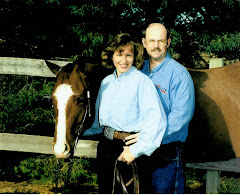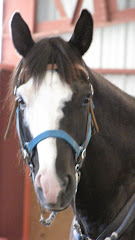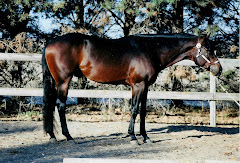Are geldings timid, scared, quiet, bold, pushy, dominant, playful, or a big puppy dog? If they are in a herd, why are there geldings with each of these personalities? Does their actions affect their personalities and/or behavior? Or does their personality affect their actions and behavior? Can they change and act differently? What would it take to change the personality and/or behavior?
If there is a mare in a herd, I have always seen the mare be boss. Even if there is a bully or pushy gelding, he will not push that top mare around. They may be buddies, as I’ve seen with my passive herd mare and our show gelding. He may have appeared the boss, but she ruled with her quiet, assertive personality. The gelding will try to push his way in, but the mare will win. Some of the other horses may always have a fresh bite mark. Why is there always this challenge for a place in the hierarchy? Eventually, things will quiet down. Then there is a change. Add a new horse. Take away a horse. Younger, timid horses get older, and they start challenging for a higher level. They have become too familiar and now think they own the place. They have a lesson coming!
The top gelding at my place has been the gelding who has been around the longest, not necessarily the oldest horse. This happens in each lot or pasture. When those geldings from different pens, are put into the same area, the gelding who has been at the place the longest, is still the top gelding. The horses have known each other over the fence. Sometimes, they have been in the same lot in the past, and I had rearranged the herd. Sometimes, some horses need more grain, the young ones are kept together, the broodmares are separated off, or the lesson horses are put into their own pen. There is usually no fighting when they are rearranged, but the first time the top gelding is in a pen with a new horse that he has never been in a pen with before, the top gelding will run the new gelding around for a little bit. The top gelding is seems to “herd” him around, putting him in his hierarchy place. The new gelding usually finds the most timid horse to hang out with, giving him a peaceful buddy.
Personality types affect herd hierarchy. A timid gelding is not going to be top dog since he will never fight for that position. Timid geldings could be scared, but not always. They just want to be left alone and go with the flow! They will hang out with whatever horse is not going to push him around. Timid geldings will hang out with the quiet horses, either mares or geldings. They must get picked on because you can almost see them say, “Don’t hurt me.“ Quiet geldings aren’t necessarily timid, they go with the flow and are everyone’s friend. They must have an inner strength, because I don’t see the top gelding pick on this type. They don’t throw off vibes that say, “hey, I’m going to be boss today”. They don’t care where they are in the hierarchy as long as everyone gets along with them.
The bold gelding will always fight for top position. Size doesn’t matter, but he is assertive and sure of himself. He is a dominant personality. Through his actions, he lets everyone know he is boss male horse. The bully gelding is not necessarily top dog, he is just pushy. He only throws his weight around. The bully gelding will run off more timid or quiet geldings, making him seen like top gelding. But watch this gelding around geldings who are more sure of themselves, and you will see who the top gelding really is. I usually see more fighting between these two type of horses.
A quiet gelding is a big puppy dog, but all geldings can be. If all horses, geldings and mares, get affection, grooming, and are treated like they are liked, they will enjoy being around you. I know that my horses like being caught and are at the gate waiting when they think they are coming up to the barn. I’ve gotten in the habit of feeding whoever I am working. They need the extra nutrition if they are worked. They know when they come to the barn, they get a special meal. Now, that might seem like a bribe, but if that is what my horse enjoys, then he starts enjoying grooming more, because, as he is eating, he is groomed. Then he starts enjoying seeing me, because that could mean a treat. If he enjoys me, then he starts to stand quiet in his stall, becomes quieter in his demeanor, and accepts the grooming and saddling as part of his treat time. That doesn’t mean everyone time I walk into the lot, I take the horses out and feed them. That doesn’t mean every horse that comes into the barn, gets a meal. If they are bully, they stand tied. If they are whinying for their friends, they stand tied. When they quiet down, they get a small meal. They learn that they better be good or they get tied until they are good. The smart ones figure this out fast. I do set them up to be good as I always try to bring in at least 2 horses that need to be tied. They learn to quiet down faster, and that is my goal. I try to make their job easier.
The scared, timid, ones need quiet time and slowness from you, to build up their confidence. The bold, top gelding and the bully horses need quiet assertiveness from you. They will sense that you are boss if you stay firm and sure of your actions. The quiet gelding is easy because he already wants to be with you. But he may be so quiet that his training may take longer. He may not move over when asked to, or pick up his feet as fast, or even walk out of the stall as he loves staying there and being groomed!
My horses seem to hang around me when I go into the lots. I will give them a rub on the forehead, and down the front of their face, which they all love. All horses will turn into your best buddy with time, and be your puppy dog! Wouldn’t it be neat to have a horse whose only mission in life is to please? I think so!!! Give whatever you love what they need and they will love you back!
Thanks for coming along on the ride!
Brenda
Turning Night to Day
9 years ago







No comments:
Post a Comment